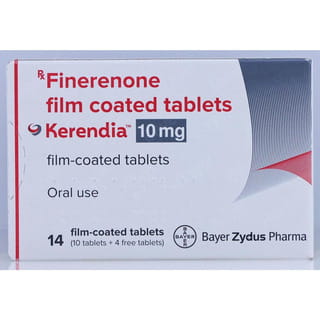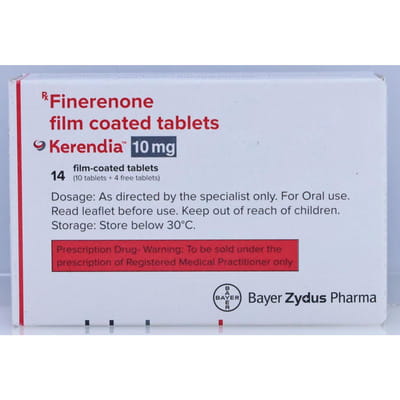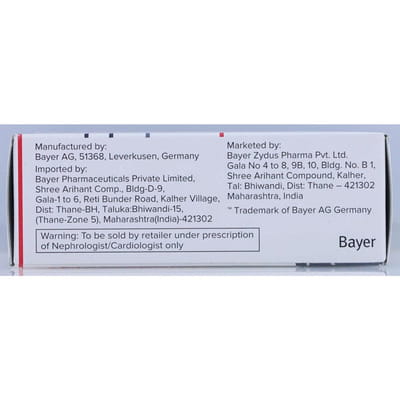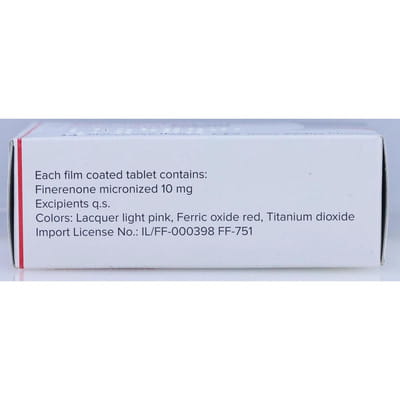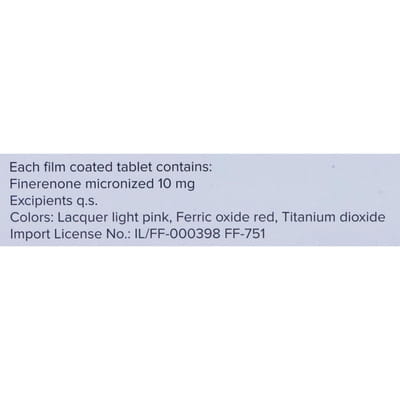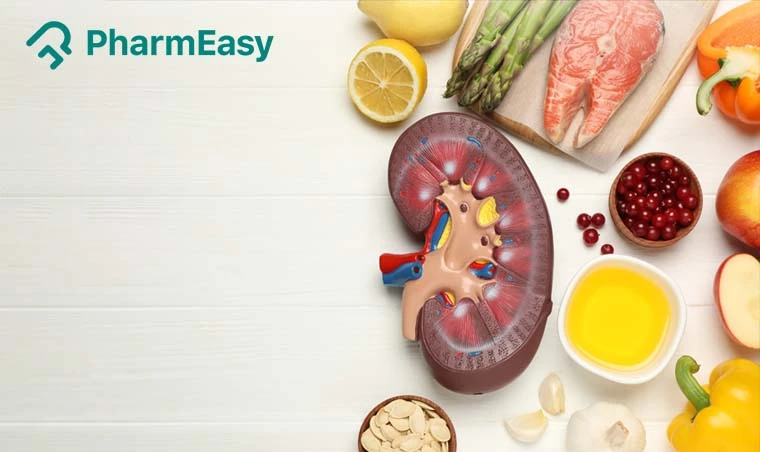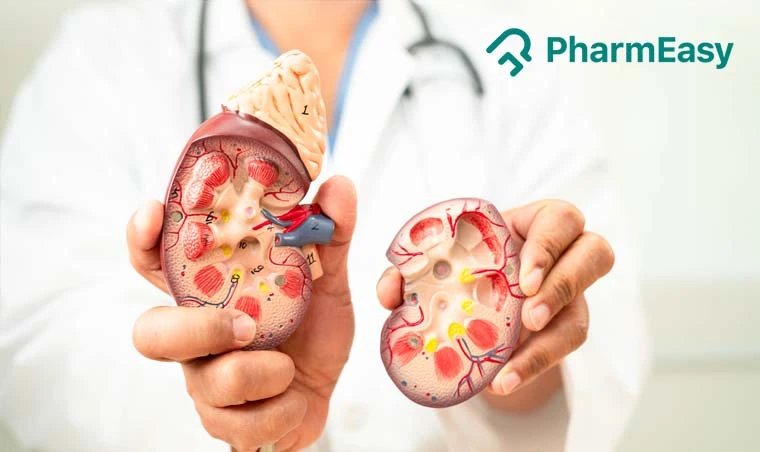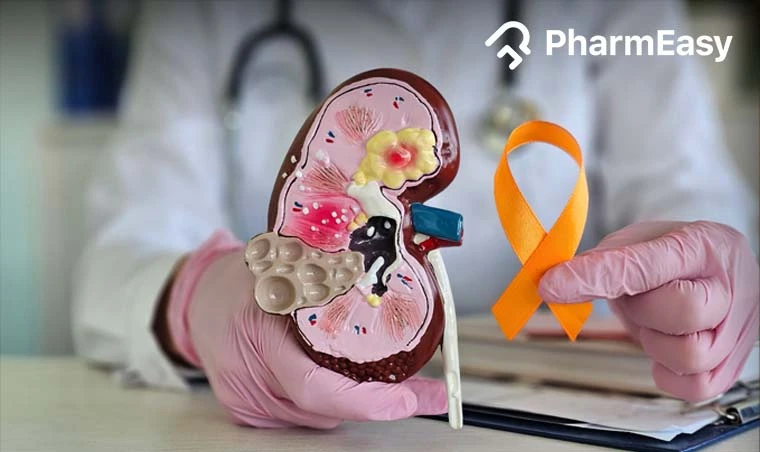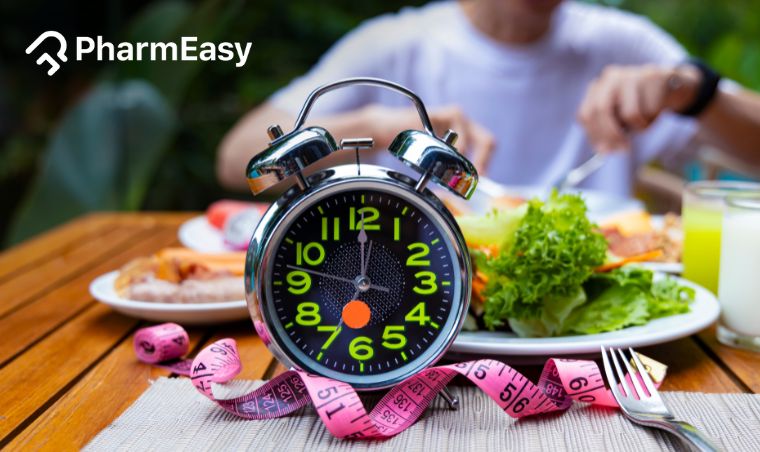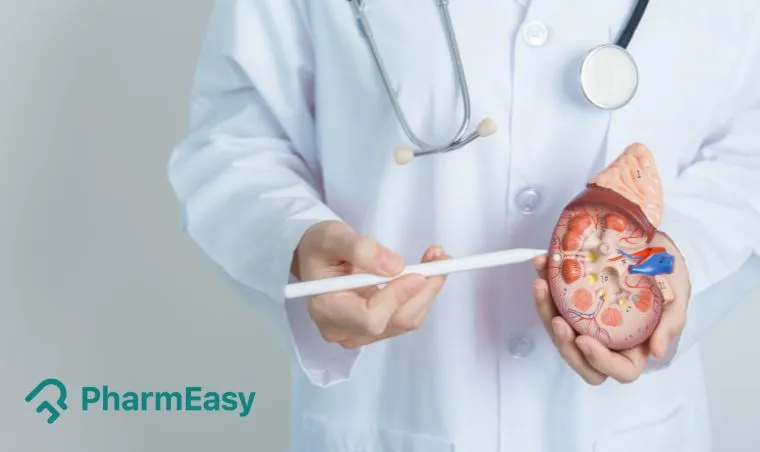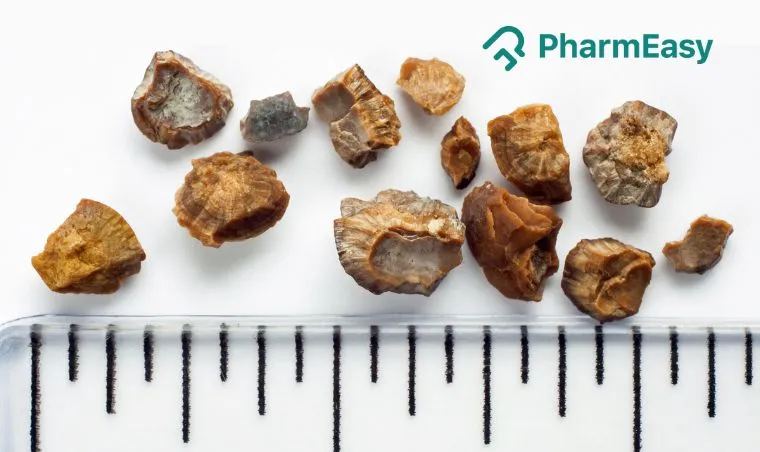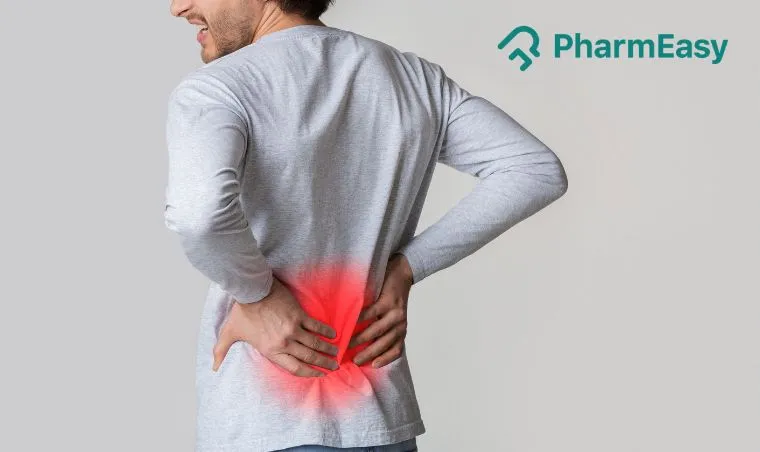Kerendia 10mg Tablet
Description
Kerendia tablet contains Finerenone; it is used to reduce the chance of kidney problems getting worse and to lower the risk of serious heart issues in adults who have diabetes-related kidney disease. This tablet helps prevent further decline in kidney function, reduces the risk of heart attacks, and lessens the need for hospitalization due to heart problems. Finerenone works by inhibiting the action of specific hormones within the body that may cause damage to the kidneys and heart.
During treatment with Kerendia tablet, your physician may regularly monitor your kidney function and blood potassium levels to ensure the safety and effectiveness of the treatment. Take Kerendia tablet exactly as prescribed by your doctor. Swallow the tablet whole with a glass of water; do not crush or chew it. It can be taken with or without food. Avoid consuming grapefruit or grapefruit juice while on Kerendia tablet, as it may result in undesirable side effects.
Before starting Kerendia tablet, inform your doctor if you have elevated blood potassium levels. Refrain from using Kerendia tablet if you are allergic to finerenone or have Addison’s disease. Women of childbearing age must utilize reliable contraceptive methods to prevent pregnancy while on this medication. Breastfeeding while taking Kerendia tablet is not recommended, as it may pass into breast milk and harm the nursing infant.
Concomitant use of Kerendia tablet with certain medications such as antibacterial, antifungal, and antiviral agents, potassium supplements, antidepressants, and blood pressure-lowering agents should be avoided as a precautionary measure. The most common side effects associated with Kerendia tablet include elevated blood potassium, sodium, and uric acid levels, as well as low blood pressure. If you experience any of these side effects, consult your doctor promptly.
Product Summary
| Offer Price | ₹1051.17 |
| You Save | ₹350.39 (25% on MRP) |
| Contains | Finerenone(10.0 Mg) |
| Uses | Management of chronic kidney disease associated with type 2 diabetes |
| Side effects | High potassium level, Low sodium level, High uric acid level ,Low blood pressure causing dizziness and fainting |
| Therapy | DRUG FOR CHRONIC KIDNEY DISEASE |
Uses
- Kerendia tablet is a prescription medication used in adults who have diabetes-related kidney disease
- Reduces the chance of worsening kidney problems and lowers the risk of severe heart issues.
- Helps prevent further decline in kidney function
- Reduces the risk of heart attacks
- Reduces the requirement for hospitalization caused by heart problems
Contraindications
- Allergy to the finerenone of any other ingredients of this medicine
- Concomitant treatment with strong inhibitors of CYP3A4 enzymes, e.g., itraconazole, ketoconazole, ritonavir, nelfinavir, cobicistat, clarithromycin, telithromycin, nefazodone
- Addison's disease (A disorder in which the adrenal glands don't produce enough hormones)
Side effects
- Hyperkalaemia (High potassium level)
- Hyponatraemia (Low sodium level)
- Hypotension (Low blood pressure)
- Hyperuricaemia (High uric acid level)
- Pruritus (Itching)
Precautions and Warnings
Pregnancy
Breast Feeding
Driving
Alcohol
Other General Warnings
- you have Addison’s disease (an endocrine disorder in which adrenal glands do not produce sufficient hormones)
- you have high blood potassium levels
Directions for Use
Storage and disposal
Quick Tips
- Kerendia tablet is used in the management of chronic kidney disease in patients with type 2 diabetes. Finerenone, the active ingredient in Kerendia tablet, acts as a selective nonsteroidal mineralocorticoid receptor antagonist, blocking the effects of aldosterone. ...
- This hormone, if left unchecked, can contribute to kidney damage by causing salt and water retention. Common side effects of Kerendia tablet include high blood potassium, sodium, and uric acid levels, as well as low blood pressure, which may manifest with symptoms such as nausea, tiredness, weakness, muscle cramps, numbness of hands and feet, dizziness, and joint pain. ...
- It's crucial to inform your healthcare provider about all medications, supplements, and herbal products you are taking, as Kerendia tablet may interact with certain medications.
- Kerendia tablet is typically taken orally with or without food, as directed by a healthcare professional. However, it's not recommended for use in pregnant or breastfeeding women due to potential harm to the fetus or nursing infant. ...
- Lifestyle changes, such as dietary modifications and increased physical activity, may complement the effects of finerenone and should be discussed with your healthcare team. If a dose of Kerendia tablet is missed, it's generally recommended to take it as soon as remembered, but double doses should be avoided. If there are concerns or uncertainties, consult with a healthcare provider....
Dosage
Overdose
Missed a Dose
Mode of Action
How Does It Work?
Interactions
Interactions with other medicines
- Some medicines can affect the way Kerendia tablet works or Kerendia tablet can reduce the effectiveness of other medicines taken at the same time.
- Tell your doctor about all the medicines, supplements or herbals you are currently taking or might take to avoid any possible interaction.
- Especially if you are taking the following medicines
- Antifungal agents: These include medications like itraconazole or ketoconazole, commonly used to treat fungal infections.
- Anti-HIV agents: Medications such as ritonavir, nelfinavir, or cobicistat, which are used in the treatment of HIV infections, should be disclosed to your doctor.
- Antibacterial agents: Your healthcare provider should also be informed about drugs like clarithromycin or telithromycin, which are prescribed to combat bacterial infections.
- Additionally, it's important to disclose the use of:
- Diuretics: Such as amiloride or triamterene, which are commonly used to increase urine output and reduce fluid retention.
- Other medicines similar to finerenone: Eplerenone, esaxerenone, spironolactone, or canrenone have similar effects on the body.
- Trimethoprim or a combination of trimethoprim + sulfamethoxazole: Used in the treatment of bacterial infections.
- Potassium supplements: These are often prescribed to replenish potassium levels in the body.
- Erythromycin: An antibacterial agent used to treat various bacterial infections.
- Verapamil: A medication used in the treatment of heart conditions.
- Rifampicin: Often prescribed for the treatment of tuberculosis (TB).
- Antiepileptic medicines, Such as carbamazepine, phenytoin, or phenobarbital, are used to manage epilepsy.
- Antidepressants: Including St. John's Wort, fluvoxamine, and nefazodone, which are used to treat depression and other mood disorders.
- Blood pressure-lowering agents, Such as atenolol, amlodipine, enalapril, telmisartan, and olmesartan, are prescribed to manage hypertension.
Content Details
Dr. Nikita Toshi
BDS (Bachelor of Dental Surgery), WHO FIDES member
Dr. Ritu Budania
MBBS, MD (Pharmacology)
Frequently Asked Questions (FAQs)
Q: What is the use of Kerendia tablet?
Q: What are the side effects of Kerendia tablet?
References
Did you find this medicine information helpful?
Please rate your experience
